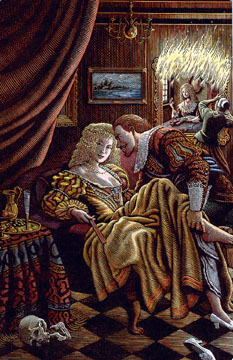Messed up Mother Goose

A different take on Cinderella ? Gregory McGuire?s The Ugly Stepsister
April 23, 2003
Imagine the terrorist-type activities of a Gestapo-esque police force as they goosestep over those who are different while rebels find love amidst the backdrop of a terrified populace. Sounds like a World War II love novel right? Wrong, it’s the setting for the novel Wicked:The Life and Times of the Wicked Witch of the West in good old Oz, land of yellow brick roads, home of the Emerald City, talking animals, and witches.
I discovered Gregory McGuire’s novel when I happened to come across the oddly framed cameo of a green-skinned woman who became known to myself and numerous other readers as “Elphaba,” (Fabala to her father, Elphie to her friends). This twisted fairytale relates the entire sordid history of Elphie, so-called “Wicked Witch of the West.”
In Baum’s delightful children’s tale, Dorothy was a good little girl from Kansas who happened to have her dog and house snapped up by a tornado and dropped into the land of Oz. Unfortunately, her humble abode ends up dropped on top of a munchkin-scaring witch, specifically the Wicked Witch of the East, sister of the West Witch. The Wizard, and ruler of the Emerald City, sends her on a quest with friends she meets along the way (the Tin Man, Cowardly Lion, the Scarecrow, and, of course, ToTo) to get a broom from the Wicked Witch of the West, after acquiring a rather stylish pair of red shoes from the latter’s deceased sibling. Needless to say, it ends happily ever after.
Meet Elphie, the teenage rebel and daughter of a Unionist minister (as opposed to the pagan Lurlinist types who believe in tick-tock magick) and a socialite, opium-addicted mother. With her preternatural green skin and allergy to water, we watch Elphie grow from a clairvoyant child, to a stubborn and brilliant young woman campaigning for the rights of Animals everywhere. (I say Animals, as opposed to animals because the former are capable of speech and imbued with anthropomorphic qualities while the latter are dumb, incapable of any higher intellectual function.)
It is in the politically charged atmosphere of the Emerald City that Elphie adventures into the life of a college coed at Shiz University. Here, she finds friends, conspiracies, and meets the love of her life, later to be destroyed by a secret police squad that should have ended her own instead. Whether it’s the eerie comparisons to 1930’s Germany or the combination of magick and science, Elphie grows into a powerful, mysterious, and reclusive woman who’s demise comes about only through a chance encounter with a little girl named Dorothy. Yet, underlying it all are the machinations of the sinister usurper of the rightful Ozymandias’ line, the Wizard and an omniscient old woman who are instrumental in Elphie’s eventual assassination.
McGuire does not set out to rewrite the ending, so I’m not giving anything away. He merely takes the skeleton of a good story and brings a children’s tale into an adult perspective, giving it an air of 1984. He does it again in Confessions of an Ugly Stepsister.
Here’s something the brothers’ Grimm and L. Frank Baum never thought of: Taking two sisters, one mentally disabled, named Ruth, and the other painfully plain and extremely intelligent, called Iris, and setting them in 17th century Holland. Margarenthe, the image of the archetypal “wicked stepmother” is a greedy, grasping widow with two children who manages to scheme her way into the Van den Meers. What follows is a scenario just as tumultuous as his previous novel, which sets convention on its ear.
Both novels are a fun read and may be taken on either a serious level, in that they both question societal norms, or that of a lighter side in the pokes and gibes they take at our old favorites. Either way, they still give the reader a license to delve back into a child’s tale from an adult perspective.




















































